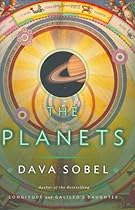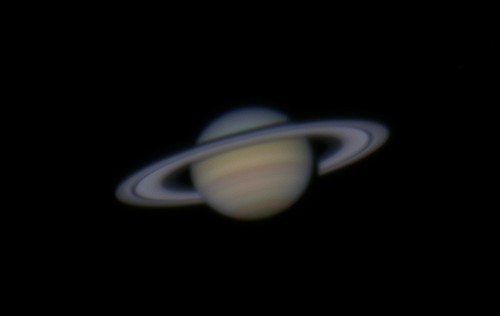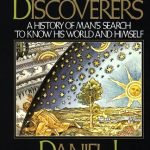 In The Planets by Dava Sobel, one learns of the trivia and facts associated with each planet, as well as the moon and sun, in poetic terms. Scientist Dava Sobel, a New York Times bestselling author, shows that science can be beautiful and lyrical, not technical. Among other things, she tells of the mythology of Mercury, the superstitions associated with the Moon, the science fiction of Mars (told from the perspective of a rock from Mars), and the astrology of Jupiter, adding lots of interesting tidbits of information.
In The Planets by Dava Sobel, one learns of the trivia and facts associated with each planet, as well as the moon and sun, in poetic terms. Scientist Dava Sobel, a New York Times bestselling author, shows that science can be beautiful and lyrical, not technical. Among other things, she tells of the mythology of Mercury, the superstitions associated with the Moon, the science fiction of Mars (told from the perspective of a rock from Mars), and the astrology of Jupiter, adding lots of interesting tidbits of information.
I enjoyed reading The Planets: it was a quick and naturally paced overview that gave me increased appreciation for the science that decorates the sky. I’d highly recommend her book for people looking for a popular (non-technical) approach to the subject.
Because I’m also watching a Carl Sagan program on the same subject, I felt like Sobel’s book was lacking. Both Sagan and Sobel impart of their own passion for the cosmos, but while Sagan’s seems full of facts, Sobel’s for some reason seems superficial – although it’s clear she’s done extensive research (and she includes a bibliography at the end).
In the end, though, Sobel’s book is probably just right for a general, easy-to-approach book (and a fast read) about a fascinating part of our life: the night sky.
Each planet Sobel discusses has some interesting aspect that is associated with it and discussed in greater detail.
- The Sun: Genesis (an evolutionary look at creation in the most beautiful terms I’ve ever read*)
- Mercury: Mythology (a look at the ancient myths relating to the night sky)
- Venus: Beauty (Venus is female in most traditions and therefore a common subject of poetry)
- Earth: Geography (an examination of discovery and discussion of our knowledge of our earth)
- The Moon: Lunacy (superstitions abound when the moon is considered)
- Mars: Science Fiction (stories of Martians have flourished since the late 1800s, and life once existed on Mars)
- Jupiter: Astrology (a history and explanation of some basic aspects of astrology)
- Saturn: Music (Saturn and its rings has been most commonly associated with music)
- Uranus and Neptune: Night Air (Uranus and Neptune are inseparable, and studying the sky mathematically helped determine the existence of Neptune)
- Pluto: UFO (Pluto’s status as a planet has always been in question)
*While Sobel maintains a mix of creationism and evolution, it’s neither overly religious nor overly scientific; both are in harmony.

My favorite planet is and always has been Saturn. There is something about the rings that I find absolutely beautiful. I also appreciated Sobel’s discussion of “music” as associated with Saturn because I also love music. The chapter on Venus also fascinated me.
I’ve also read Galileo’s Daughter and Longitude by Dava Sobel, which likewise approach science from a non-technical, easy-to-read format. Many thanks Heather at Age 30+: A Lifetime of Books for this review which prompted me to read this book.
Happy Thanksgiving + A Giveaway
I’m going to be out of town for a week for the Thanksgiving Holiday. I will have Internet access, but I don’t want to worry about automatic posts while I’m eating turkey and visiting with family, so I’m not going to post again until I get back. I will check comments and delete any spam; I may or may not respond to comments.
In the meantime, I’d like to giveaway my lightly used copy of The Planets to a reader of Rebecca Reads.
(The book itself is gorgeous: while it is paperback, the cover has a cool die-cut of Saturn peeking through. Each chapter also has a gorgeous full-page, full-color illustration of the heavens. I almost want to keep it just because it’s pretty. But, I’ll share.)
This giveaway is open to anyone in the world; it ends Tuesday, December 2, 2008 at 11:59 p.m. CST.
If you are interested in winning The Planets, please tell me what your favorite planet is (or the sun or moon). Why is it your favorite?
I’ll let random.org choose a winner Wednesday, December 3, 2008.
Have a happy Thanksgiving or a happy week (depending on where you live in the world).
If you have reviewed The Planets on your site, please leave a link in the comments and I’ll add it here.





Well, I’m going to have to go with the Earth, since it sustains us.
Is this book suitable for children to read? My 8 year old (who reads well above his age level), loves to read about the planets and outer space, and I think this might interest him. He says his favorite planet is Saturn because of the rings. So go ahead and enter me if this wouldn’t be inappropriate, content-wise, for a child. Don’t worry about the reading level, he’ll be fine with that. Thanks!!
I think I’m also going to have to go with Earth because its really the only planet I know a lot about. I’d really like to learn about the other planets, though.
Amanda, I think it would be great for an 8-year-old reader. Can’t recall any content that would be off. Not too many details, and a great, entertaining and educational overview!
I’m not entering the giveaway, since I already read the book – here’s my review. I’m glad you enjoyed it too!
Though it is a satellite and not a planet, I choose the moon. My youngest son has a fascination with the moon. He is twenty now and still calls me from college on really beautiful nights to tell me to go outside and look at it. His love of science (astronomy minor) was born at six months of age when he used to break his little neck to find it in the sky. The memories of that little boy, always seeking the moon and its mysteries, is what easily influences my choice 🙂
I love looking at our moon in all its phases…especially when it is full. I’ve seen the full moon rise as a giant red-orange ball in the lower sky and as the night progresses it coats the night with a silver sheen. Beautiful!
All right, count me in then Rebecca. 😀
Dava Sobel also wrote Galileo’s Daughter. An excellent book.
Thanks for all of the answers! I’ll be drawing a winner Wednesday!
blacklin, yes, as I said, I’ve read Galileo’s Daughter as well and also enjoyed that!
This is kind of embarrassing to say, but my favorite has to be Uranus. Regardless of how you choose to pronounce its name, I find the mysterious blue orb that is Uranus to be intriguing. It just looks like a sky blue ball of gas in all of the pictures that I’ve seen, but the fact that it is considered a planet means that there has to be some substance under that gas and we just can’t see it. I just love to imagine what must be there.
I’m so glad that you enjoyed this book. It was a simple read yet very interesting to me. And you’re right, it is a GORGEOUS litte book!
Heather J., Thanks again for bringing it to my attention!